If Watch Dogs is to be believed, then a shocking number of Chicago residents are delinquents. As you roam the city looking to both right what is wrong and make wrong what is right, you hack into its citizens' smartphones and listen in on their conversations, and even tap into their computers and catch a glimpse of them as they enjoy their deviations in the supposed privacy of their own homes. Some of these Chicagoans are chronic masturbators; others are criminals and cannibals, ordinary to look at should you pass them on the street, but far from ordinary when they think they are alone.
Aiden Pearce is also far from ordinary, but he understands that privacy is a myth. The city has installed a computer system called ctOS that knows everything, sees everything, and controls everything. Aiden is a hacker. By manipulating ctOS's systems, Aiden can steal from your bank account, gain access to surveillance cameras, and even discover your profession and learn where you went on vacation, or whether you're faithful to your spouse. Aiden's nefarious talents are valuable, and he once had no qualms about who he killed or robbed, as long as he delivered the information and earned his reward.

You'd suppose, then, that information is your most powerful tool in Watch Dogs, but this open-world game's joys come not from voyeurism and information brokerage but from chaos and destruction. Combat encounters are structured like puzzles: Aiden hunkers down and you survey the area, choosing whether to dominate your enemies with firearms and grenades, press against cover and distract your enemies so that you can pass by without raising their suspicions, or settle on a compromise, silencing enemies with well-aimed headshots and taking them down from behind with a swift takedown maneuver. But whichever style best suits the occasion or your mood, you're likely to cause a few explosions and toy with your enemies' heads.
How do you create such chaos? By overloading circuit boards, setting off guards' grenades remotely, or forcing pipes to burst beneath your foes' feet. Such control, right at your fingertips; thanks ctOS! When I felt particularly evil, I threw a distraction lure toward a circuit board and detonated the board as a nearby guard approached. He cried out in agony, and I was grateful that I had one less obstacle between me and my destination. But this kind of evil could feel even more heinous if I happened to glance at my victim's personal information before annihilating him. Oh--he was recently married. Or perhaps he was on antipsychotic medication. Occasionally, I would hesitate to put a bullet in a guard's head if I knew his wife was expecting a child, but I rarely had reservations about murdering a prison escapee. I was deciding whose life had greater value, and I'm grateful that Watch Dogs, in its own subtle way, led me to ponder why I would prize one man over another. With one snap moral judgment, I might decide to let one man live and another die. Unless, of course, I was under fire from every direction, in which case all bets were off.

I don't wish to overstate Watch Dogs' social musings, however. The game sometimes pauses to grapple with quandaries about the trade-off between freedom and security in modern society, but rarely reaches any conclusions or digs very deeply. This is a game that allows you to hack into highway billboards and reveal age-old memes like "I can has cheezburger?" This is a game in which you eavesdrop on a man who couldn't ejaculate during a sexual encounter because his bladder was full. Such drastic tonal shifts prevent the story's early attempts at gravitas from sticking, leaving Aiden looking like a chump with little self-awareness, and leaving the player to wonder what really drives this vigilante, apart from the revenge quest that has him seeking to retaliate against unknown persons for the death of his niece. When his sister, Nicky, pleads with him to stop his pursuit, explaining that he's risking the safety of his remaining family, Aiden makes a promise he doesn't ultimately keep. Why he is so willing to seek vengeance while knowing he's putting his sister and nephew in peril is never sufficiently explored. Perhaps Aiden is addicted to the underground life he has come to lead, which has him staring at his smartphone's screen in the same way that I so often do, oblivious to what's happening around me.
I came to be more invested in the story once I'd assembled a small team of hackers and closed in on the conspiracy at the game's center. Watch Dogs' tale is at its best when it sticks to its Tom Clancy-style technospeak and leaves behind the revenge-story cliches that seem to power every tale about a man dealing with his anger over a female loved one. My devotion was not to Aiden, however, but to his friends Clara and T-Bone. One character describes Clara as a "punk-rock chick," but she's not so remarkable for her tattoos and knee-high boots as she is for her empathy toward Aiden and her patience for his stubbornness. And if Clara's type is punk-rock chick, then T-Bone is the Southern-fried genius, a down-home intellect who thankfully keeps the Hee Haw language to a minimum.

Aiden eventually matures, albeit too little and too late, and wonders aloud who should get to choose whose lives are less important than others. Shortly thereafter, that question still lingering, you decide if Aiden should be that person. By that point, it was clear to me what he must do, based on audio logs I'd found scattered across the city. I was glad I'd taken the time to learn what I did; finding those logs isn't required to finish the story, after all. And I was glad that Aiden at last was asking the same question I had many hours beforehand: Does the loss of one life justify mowing down dozens or hundreds of men, and risking my own sister's life in the process? If only he had pondered such obvious concerns hours before, I may have been more concerned about his ultimate fate.
Watch Dogs' narrative may win no awards, but as an open-world playground, the game rightfully deserves to be mentioned with heavyweights like Grand Theft Auto and Saints Row. This playground isn't just loaded with stuff to do, as most such games are; it's loaded with lots of terrific stuff to do. I lost myself for an hour solving chess puzzles. Other times, I shot up aliens in several of Watch Dogs' augmented reality games. And still other times, I would locate remnants of QR codes painted on walls and overpasses, and hack from one camera to the next, looking for the angle that would let me view the entire code. Even the smallest activities are fully engaging. Not only are the chess puzzles clever, but I listened to two women converse about job woes as I solved them, which gave me an additional dose of entertainment. The alien shoot-'em-ups occur on Chicago's busy streets, where I got to witness car-crash victims gesticulate in anger at each other while I fired my holographic gun at virtual aliens. And like several of Watch Dogs' core activities, lining up QR codes kept my brain cells buzzing as I experimented with cameras and moved to different positions, hoping to merge those painted patterns into a cohesive barcode.
Some of these Chicagoans are chronic masturbators; others are criminals and cannibals, ordinary to look at should you pass them on the street, but far from ordinary when they think they are alone.
Moving from one activity to the next often involves summoning a vehicle to a nearby location, or simply nabbing one from the roadside or carjacking an innocent driver as she pulls up to a traffic light. Those drivers will not be happy--in fact, they may even call 911 and summon the cops--but it's worth getting on the po-po's bad side if it means racing through the streets in Watch Dogs' sizable collection of automobiles, or zooming through the canals in a speedboat if you happen to be near the water. Vehicles are rather bouncy, but the loose physics make for ecstatic moments, particularly during chases. As you speed along, you can trigger steam pipes beneath the streets to erupt and take down your foes, or cause jams by hacking into traffic lights. My favorite method of escape, however, was to raise a drawbridge as I approached it. I would fly up the first span, soar through the air, and land with a satisfying jounce on the other side; my pursuers would be left behind, blocked from entry. I could practically imagine the coppers throwing their caps on the pavement and cursing my keen driving abilities.
My favorite moments behind the wheel were those I shared online with competitors. Watch Dogs' single-player missions and multiplayer activities are merged into one experience, and the game frequently and annoyingly nags you with opportunities to engage with others should you not seek those activities for yourself. It's almost always worth accepting those offers, however, particularly should you be invited to an online race, or even better, invited into a decryption match.
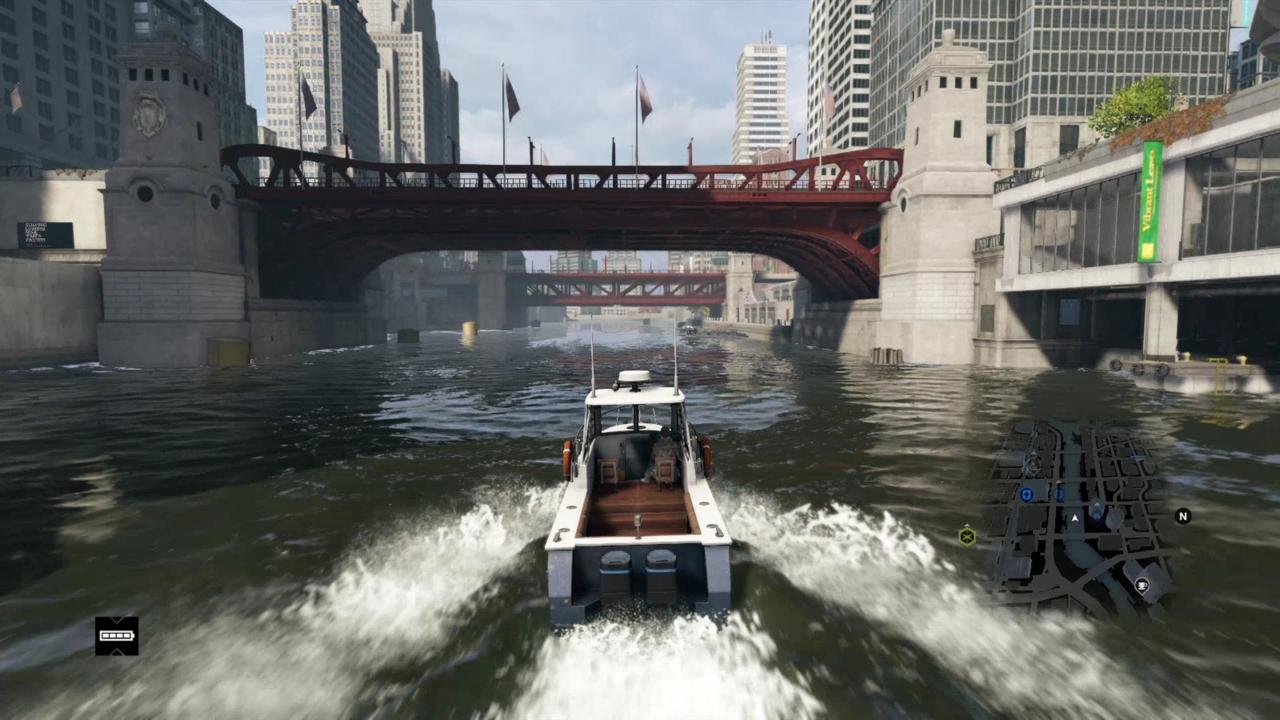
Both modes are excellent ways to wreak havoc in the windy city. Online races offer plenty of ways to mess with your competitors. If you're trailing behind the leader and you approach a lowered blockade, raise it with the press of a button: your opponent bangs into it and snarls under her breath, and you cackle and rush into the lead. If you're crossing said blockade when another player raises it, you might bounce into the air and land on top of another racer. Should you activate the blockade too soon, you might end up obstructing your own vehicle with only yourself to blame. Open gates and close them behind you to throw off a tail, or hack a traffic signal and get him stuck in a jam. There are enough shortcuts, however, that there's no reason you can't gain ground after finding yourself on the wrong end of a blockade.
Decryption mode, in which two teams of four are confined to a portion of the city and seek to nab and hold on to sensitive data, is anarchy in its most captivating form. There are a few details that separate this mode from its capture-the-flag cousin, the most important of which is that you only have to remain within the data carrier's proximity for a certain amount of time to steal the data. This allows data to be passed around even when you are in vehicles, or without necessarily directly engaging a carrier hiding on a rooftop above. At one point, I rammed head-on into a carrier riding a motorcycle, and I watched his body fly above my windshield before it soared out of view and landed with a thud behind me. A teammate then leapt into my vehicle's passenger seat, and we zoomed away while my comrade fired his rifle at a pursuing ambulance. The action is constant--and constantly on the move--and the shooting is as sturdy as you'd expect in any given third-person shooter. Whether you're dealing death by shotgun or by cement truck, it's difficult not to be swept up in the pandemonium, cheering or groaning with each unexpected development.
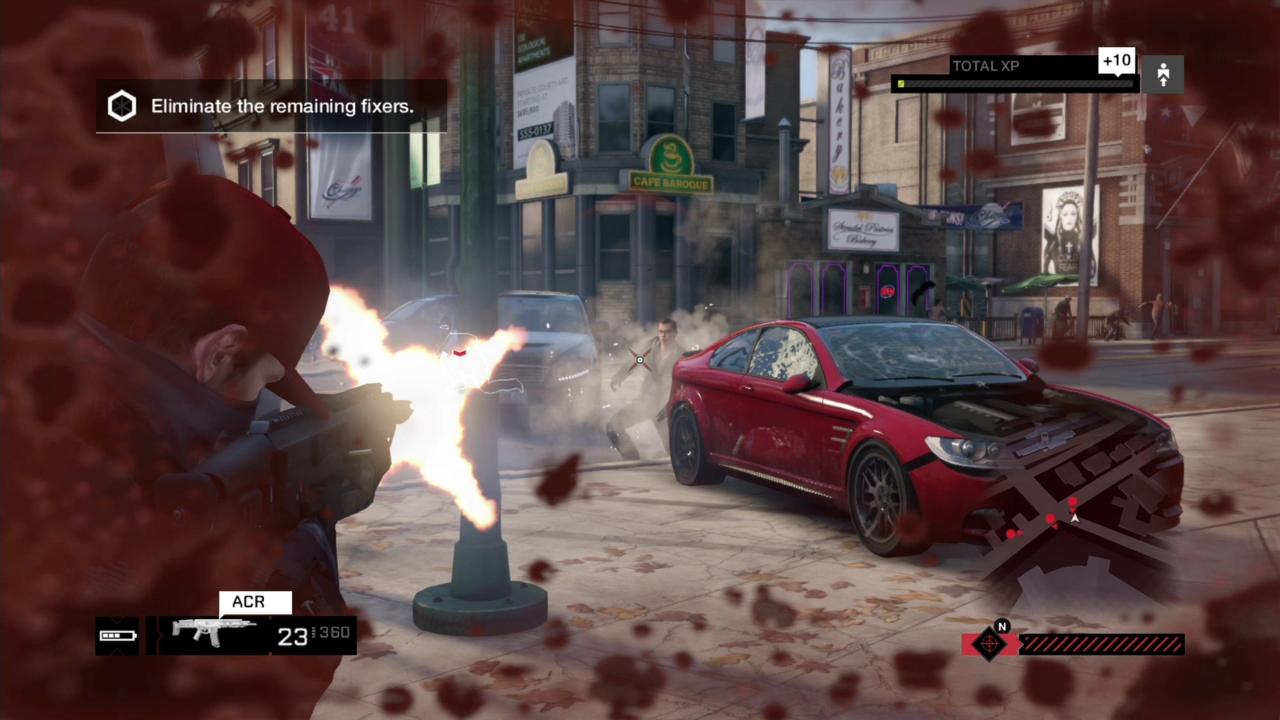
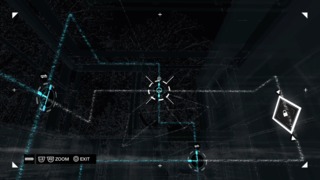
Online invasions are less explosive than other modes, and potentially more boring, depending on how the invasion goes. As the invader, you come close to your target, press a button to begin downloading her data, and wait. As the victim, you rush around or hack into nearby cameras, scanning the crowd for your invader. (You always see yourself as Aiden, but other players see you as a random Chicagoan.) Neither running around looking for your hacker nor avoiding her watchful eye is engaging on its own. But catching the data thief initiates a chase sequence that leads to Watch Dogs' special brand of pandemonium. Rolling over a sprinting invader with an ice cream truck is one kind of delight. My favorite experience in an invasion thus far, however, was leaping into the bed of my hacker's pickup truck as he drove off, planting an explosive, and detonating the explosive as I leapt to the ground. It wasn't a moment I planned--the stars simply aligned, giving me the chance to pull off a dramatic kill. Successfully completing an invasion earns you a currency called notoriety, but earning the skills related to notoriety is so easy that there's more reward in the chase than in the subterfuge.
You can simply ignore all these possibilities and remain a lone vigilante, of course, and doing so offers its own kinds of rewards. Infiltrating gang hideouts is much like performing many of the story missions: you search for a way into the danger zone and decide how best to proceed. The wonder of Watch Dogs is that any method is reasonable--and every method is enjoyable. The weak link is the shooting, not because the mechanics aren't great (they are), but because enemies are so quick to go limp--and even more so when you activate the game's unnecessary bullet time. But if, like me, you seek to express some creativity in your encounters, you'll enjoy piecing together a stealthy route and performing a hushed assassination when it proves necessary.
Decryption mode, in which two teams of four are confined to a portion of the city and seek to nab and hold on to sensitive data, is anarchy in its most captivating form.
Watch Dogs isn't a full-fledged stealth game in the usual sense; you can't hide bodies or tranquilize mafiosos. However, slinking from cover to cover is smooth and weighty, as if Aiden is Sam Fisher's bulkier cousin. I came to rely on a move I call "riding the cameras," hacking into one camera so that I might in turn hack into another until I was able to tag all of my enemies and devise ways of thinning the herd. Riding the cameras is also the primary way you hack into ctOS centers, each of which presents an environmental puzzle to solve so that you might reveal more hot spots on your map. Many of these puzzles are quite clever, though some story missions take the camera mechanics a few steps further, particularly a prison level in which you hack into guards' personal cameras and investigate from their perspectives.
One type of optional mission--the digital trip--deserves special mention. There are four digital trips in all, each one an expansive minigame explained away as an audio-induced hallucination. One of the trips is a fun bit of frippery in which you bounce from one giant flower to the next, remaining in the air as long as possible. The other three, however, could be fleshed out into full games in their own right, which is a testament to how good Watch Dogs' individual pieces are. In the best of these, you gain control of a humongous spider-bot, battering police cars and leaping up the sides of buildings from which you fire rockets at helicopters and pellet the authorities with machine-gun bullets. Games that have focused on wall-climbing have rarely made these acrobatics feel so intuitive, and I'd gladly see the spider-bot find its way into a game fully devoted to it. The other two digital trips--a stealth sequence in which robots seek you out, and a car combat game in which the highways are lousy with zombies--are almost as delightful, and all of them have their own skill progression trees. The trips are structurally simple, but their foundations are rock-solid and rich with possibilities.
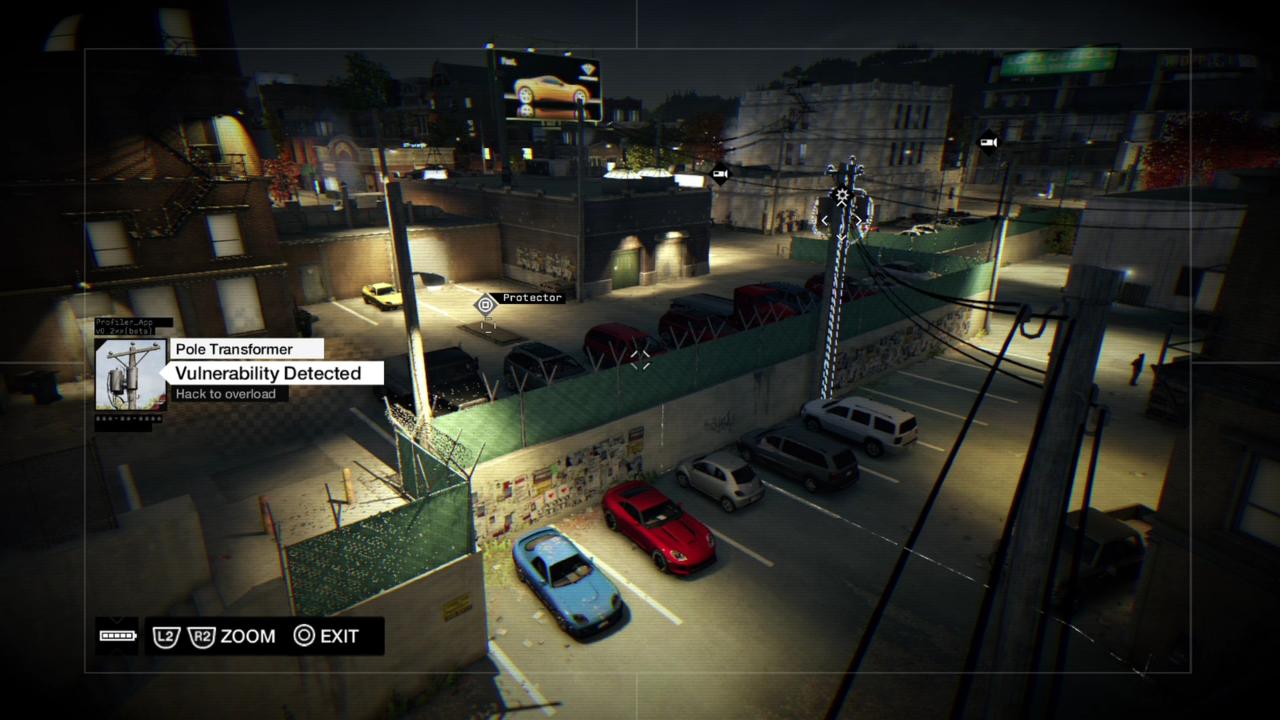
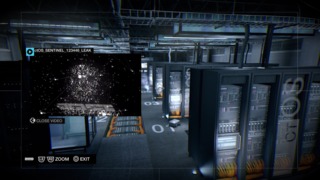
Watch Dogs does a lovely job of keeping its many interlocking systems from becoming overwhelming, though some systems ultimately feel superfluous. You can buy different outfits, but they all hew to the same basic style; you can buy new vehicles for ordering on demand, but fast cars are perfectly easy to find. As a result, the economy is never as meaningful as it might have been; apart from a sniper rifle and silenced pistol I purchased from an ammo shop, I rarely went shopping, simply because I rarely needed to. Even hacking scores of random passersby begins to feel excessive: when you have access to everything, no one person or piece of information is special anymore. Precious little of that information is actually a gateway to a human soul.
Aiden's soul is still locked away, too, even though I spent dozens of hours with him. But while I can't say who Aiden truly is, I can confidently say that Watch Dogs is a lushly produced and riotous game with an uncanny ability to push you from one task to the next, each of which is just as fun as the last. This version of Chicago is crawling with a hyperbolic number of degenerates, and I didn't mind squashing pyromaniacs and slavers under my tires as I plowed through the streets chasing after a hacker, hip-hop beats blasting from the radio. After all, the struggling mothers and homeless beggars wandering Chicago deserve some peace of mind, and doling out some street justice is a good first step.



